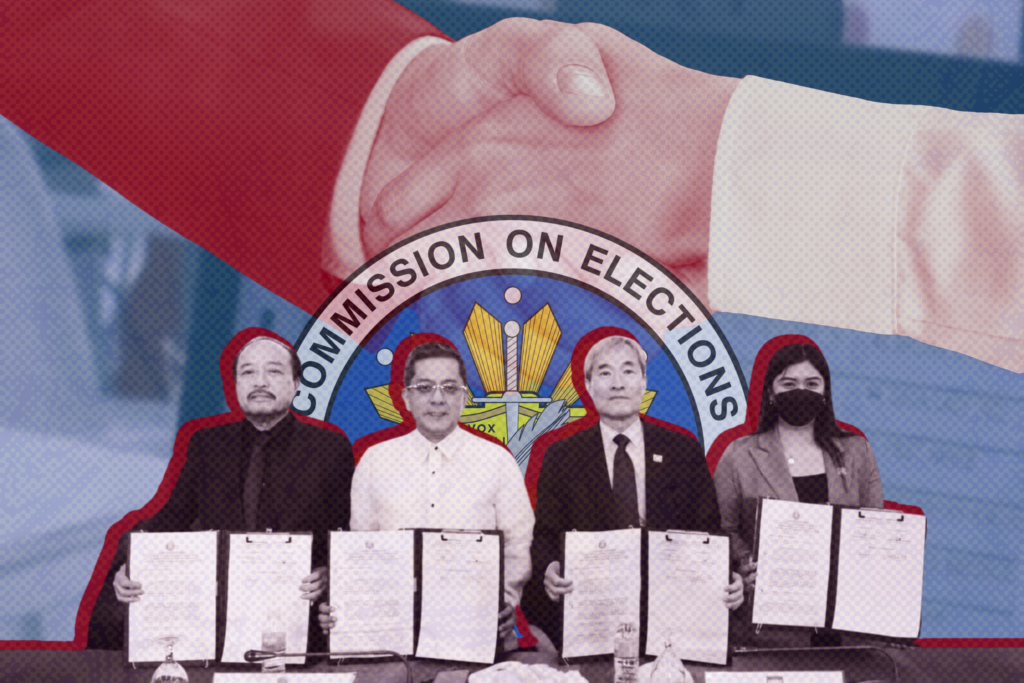Media miss possible conflict of interest in Comelec deal

THE COMMISSION on Elections (Comelec) and the joint venture led by South Korean firm Miru Systems Co. Ltd. signed on March 11 a PHP17.9 billion contract for the lease and use of the latter’s automated election system in the 2025 midterm elections.
Comelec initiated the first round of competitive public bidding for the automated election system contract in December 2023. This first cycle was declared a failure and a second round began in January 2024.
Miru Systems in a joint venture with three Filipino firms emerged as the lone qualified bidder in the second round of bidding for the project. The three partners were Integrated Computer Systems, St. Timothy Construction Corp., and Centerpoint Solutions Technologies Inc.
The media reported on the entire process and coverage focused on the dubious track record of Miru Systems as election watchdog groups, ICT professionals, and lawmakers pointed to alleged irregularities and machine failures in Miru Systems’ conduct of elections in Iraq and the Democratic Republic of Congo. Comelec denied the allegations, arguing that certifications obtained by Comelec from foreign international election bodies were sufficient in clearing Miru Systems of any suspicion. However, a representative in Congress revealed that Comelec failed to look into the allegations from the side of foreign critics.
Possible conflict of interest
BusinessMirror reported on February 3 the concerns of election watchdog Kontra Daya. Aside from expressing similar concerns regarding Miru Systems, the group also pointed to the president of Integrated Computer Systems, George Barcelon, who was appointed by President Marcos as the private sector representative to the Legislative-Executive Development Advisory Council (LEDAC).
GMA-7’s 24 Oras in a March 11 report highlighted problems that could arise because of Barcelon’s position. Reporting on the contract signing, Sandra Aguinaldo referred to the apprehension expressed by Raoul Manuel, Kabataan Partylist Representative, over the potential conflict of interest. Asked for comment, Barcelon downplayed his role in the LEDAC, describing it as not “involved in the decision-making” but merely “airing the side” of the private sector. In the deal with Comelec, he explained that his company is only involved in the “IT platform” and “has nothing to do with the whole operation of the election process.” The report did not further question Barcelon’s statement.
Only these BusinessMirror and GMA-7 reports picked up on Barcelon and his ties to the administration. Other reports (ABS-CBN News, News5, GMA, Philippine Daily Inquirer, Philippine Star, Manila Bulletin, Rappler) focused on Miru Systems and the milestones and procedural developments in contract procurement. Without reference to Barcelon, the Bulletin noted in a later report that Manuel is now requesting the presence of the local partners in the joint venture at the next congressional hearing.
Unexamined connection
CMFR’s research showed that Representative Manuel had posted his views about the possible conflict of interest on social media as early as February 22, the day after Comelec had announced the award of the contract to the joint venture. But media did not pick it up to examine the connection.
Barcelon’s appointment to LEDAC in December 2022 was well publicized by media, along with his past position as president of the Philippine Chamber of Commerce and Industry (PCCI). Some reports cited Barcelon in connection with Marcos’ economic policy, demonstrating his level of influence in the business sector. As PCCI head, Barcelon commented on pandemic tax cuts, mining laws, agricultural smuggling, regional trade deals, the Maharlika Investment Fund, the rice price ceiling imposed in 2023, the Marcos administration’s economic promises, and the president’s performance in the first year of his term—his statements a mix of critical and positive notes on the administration’s policies. PCCI describes itself as the “voice of Philippine business recognized by government,” on its website.
Republic Act No. 7640 established LEDAC as “consultative and advisory body” to the president on “programs and policies essential to the realization of the goals of the national economy.” It is composed of the president, cabinet secretaries, senators, members of the House of Representatives, a local government representative, a youth representative, and a private sector representative.
Lessons from the past
While it remains unclear just how close Barcelon is to the Marcos administration and other political players, the mere possibility should have triggered a media review of the local contractors, including an investigative probe if found necessary.
Given the history of appointments in the Comelec, the issue of its independence is crucial to the holding of fair and free elections, not just in determining the winner but also the magnitude of the electoral win. Questions continue to be raised by then president Rodrigo Duterte’s appointment of George Garcia as commissioner of Comelec, because Garcia was Marcos’ lawyer when he challenged the victory of former Vice President Leni Robredo in 2016. The involvement of businessman Dennis Uy’s F2 Logistics as a local contractor of Smartmatic in 2022 was another questionable case given Uy’s close connection to Duterte.
Media may have had some excuse during the pandemic for their failure to raise questions about Comelec’s independence and its capacity to hold elections free of partisan influence, especially of incumbent officials’.
But there is no excuse at this time to not examine every step of the way to the conduct of midterm elections in 2025. Connections should be examined, and capacities should be questioned. Electronic voting machines do not reveal cheating and how results have been manipulated.
Clearly, knowing more about local partners is a first step. There are three that media must check and watch closely even at this early stage.
Leave a Reply